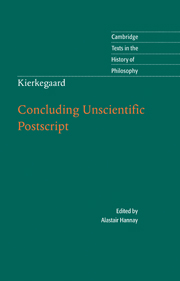Book contents
- Frontmatter
- Contents
- Introduction
- Chronology
- Further reading
- Note on the translation
- CONCLUDING UNSCIENTIFIC POSTSCRIPT TO THE PHILOSOPHICAL CRUMBS
- Preface
- Contents
- Introduction
- Part One The objective problem of Christianity's truth
- 1 The historical view
- 2 The speculative view
- Part Two The subjective problem. The subject's relation to the truth of Christianity, or what it is to become a Christian
- 5 Conclusion
- Appendix: Understanding with the reader
- A first and last declaration by S. Kierkegaard
- Index
- Cambridge Texts in the History of Philosophy
- References
2 - The speculative view
Published online by Cambridge University Press: 26 February 2010
- Frontmatter
- Contents
- Introduction
- Chronology
- Further reading
- Note on the translation
- CONCLUDING UNSCIENTIFIC POSTSCRIPT TO THE PHILOSOPHICAL CRUMBS
- Preface
- Contents
- Introduction
- Part One The objective problem of Christianity's truth
- 1 The historical view
- 2 The speculative view
- Part Two The subjective problem. The subject's relation to the truth of Christianity, or what it is to become a Christian
- 5 Conclusion
- Appendix: Understanding with the reader
- A first and last declaration by S. Kierkegaard
- Index
- Cambridge Texts in the History of Philosophy
- References
Summary
The speculative view grasps Christianity as a historical phenomenon. The question of its truth therefore means penetrating it with thought in such a way that, in the end, Christianity is itself the eternal thought.
The speculative view does of course have the virtue of being without presuppositions. It proceeds from nothing, assumes nothing as given, does not begin ‘bittweise’. So here we can be sure not to encounter presuppositions like those we met in the preceding.
One thing though is assumed: Christianity as given. It is assumed that we are all Christians. Alas, alas! Speculative philosophy is far too civil. Yes, how curious the way of the world! Once it was at the risk of life that one dared to profess oneself a Christian; now doubting that one is so is something to worry about. Especially, that is, when this doubting does not involve rushing out to have Christianity abolished, for that would be something. No, if someone were to say plainly and innocently that he was worried for himself, that as far he was concerned it might not be quite right for him to call himself a Christian, he would not exactly suffer persecution or be put to death. But angry glances would come his way and people would say: ‘How tiresome to make such a fuss about nothing; why can't he behave like the rest of us who are all Christians?
- Type
- Chapter
- Information
- Kierkegaard: Concluding Unscientific Postscript , pp. 44 - 50Publisher: Cambridge University PressPrint publication year: 2009

